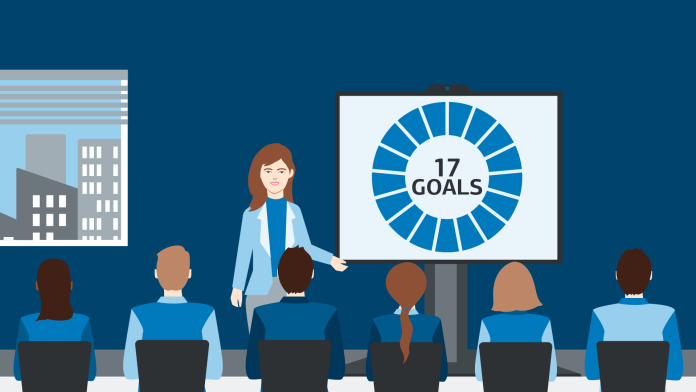We are living in a decade in which important decisions for the future are being made – decisions that will change our lives and, in particular, those of the generations to come. The most important goals are to limit global warming to 1.5 degrees and preserve our biodiversity, as well as to strengthen German and European competitiveness. We are therefore also in a decade of implementation: it isn't enough just to make decisions – they must also be consistently implemented. This requires enormous investments. In Germany alone, EUR 5 trillion must be invested in order to achieve climate neutrality by 2045. This is a figure that cannot be raised by the public sector alone: in fact, the vast majority of it has to come from private investors.
KfW is making it possible: We want to enable people, communities, companies and countries to leverage their means to the maximum in order to fulfil their responsibilities.
In this regard, the focus is primarily on the following three levers:

"This decade of decision is also a decade of investment. In order to master the transformation, we need to become faster and more specific, and we must keep an eye on the needs of the people in Germany.”
Stefan Wintels (Chief Executive Officer of KfW Group)
There is a huge need for investment in the transformation fields of digitalisation and climate action. KfW’s task is to leverage the impact of public capital in order to achieve more. More investment. More innovation. More transformation.
Many of our activities directly or indirectly increase the competitiveness of the German and European economy, and have the following as their aims:
Germany needs EUR 5 trillion in order to achieve climate neutrality by 2045. This sum can only be raised with a high proportion of private capital. The idea: steering more private capital flows into sustainable investments.

In the future, around 90% of the transformation will be financed by private capital. The Future Fund of the German government, or the international climate-oriented impact fund EMCAF are examples of public investment to mobilise private funds.

Our decades of national and international work have resulted in a global network of contacts and partnerships. For the necessary investments, we are expanding existing partnerships and forming new ones. Because after all: together we achieve more.
In general, our business model is based on the on-lending principle. This means that our promotional funds are being passed on to end customers via various financial institutions. Savings banks, cooperative banks or private banks act as our partners in passing on the promotional funds to businesses and private individuals.
At national level, we work closely with the regional promotional institutions, with the aim of also achieving targeted solutions on a regional level. We leverage cooperations and project partnerships around the world, and work on targeted framework conditions at the highest level. KfW support has made possible the following projects, for example:
Cooperation with all national and European promotional banks in the EU
The Ouarzazate solar power plant in Morocco
The expansion of local transport in cities in South America and Asia

In view of the enormous need for investment, it is essential that our promotional funds have maximum impact. To this end, systematic monitoring of our promotional activities is of central importance. This is the only way we can improve existing products and develop new need-based promotional products. In this way, we contribute to achieving both national and international goals.
A key concern for us is to record our contribution to sustainable development even more systematically, make it measurable and present it transparently for the entire group. We have therefore been gradually introducing group-wide impact management as part of the strategic projects Roadmap Sustainable Finance and tranSForm since 2020. Measurable and comparable impact indicators form the core of impact management. With its indicators, KfW-wide impact management covers all three sustainability dimensions (economic, environmental, social). We are guided by the United Nations' “2030 Agenda” with its 17 sustainability goals and international standards.

“Together with the EU, the European development banks and our multilateral partners such as the World Bank Group, we are committed to ambitious partnerships that have sustainable development as their goal. With its climate and energy partnerships, the German Federal Government is strengthening Germany’s commitment to successfully shaping the transition.”
Christiane Laibach (Member of the Executive Board of KfW)

Legal notice:
The information contained in this online Annual Report 2023 is based on KfW’s Financial Report 2023, which you can download here. Should this online Annual Report 2023, despite the great care taken in preparation of its content, contain any contradictions or errors compared to the Financial Report, the KfW Financial Report 2023 takes priority.
Share page
To share the content of this page with your network, click on one of the icons below.
Note on data protection: When you share content, your personal data is transferred to the selected network.
Data protection
Alternatively, you can also copy the short link: https://www.kfw.de/s/enkByZVY
Copy link Link copied